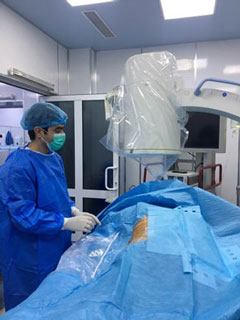Kidney cancer (tumor) is a malignant neoplasm of kidney that is mainly formed from epithelium of renal proximal tubule cells or epithelium of cup and pelvis system with a high propensity to metastasize.
Depending on spread of a tumor, methods of treatment and, accordingly, prognosis, kidney cancer can be divided into 3 types:
- Localized (confined to the kidney)
- Locally-advanced (extends beyond renal capsule to surrounding tissues and/or into renal/ inferior vena cava)
- Generalized (metastatic)
Kidney cancer, unlike the most malignant tumors, is practically not treated with radiation, hormonal or cytostatic therapy, that often deprives doctors of the chances to treat neglected forms of kidney cancer more or less effectively.
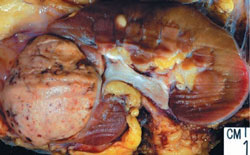 |
Today the only method of kidney cancer treatment is radical surgical intervention, as a result of which malignant tumor is completely removed or destroyed. Depending on the size of tumor or its localization, the surgery can be radical (removal of kidney) or organ-preserving (resection of kidney).
Unfortunately, today in most cases, even if the resection of kidney is possible, most often nephrectomy (removal of kidney) is performed. The fact is, that formally (according to clinical recommendations) the removal of kidney is a standard method of treatment of localized kidney cancer. It doesn`t matter what tumor it is – is it possible to remove it radically within the healthy kidney tissue.
Despite the wider implementation of organ-preserving surgery into clinical practice, main method of treatment of kidney cancer remains the removal of affected organ- nephrectomy (removal of the kidney).
 |
In 25.11.2017 the patient A.V., 53 y/o was admitted to Urology Department of MC Erebouni with complaints of the presence of blood in the urine during the last 10 months. On an outpatient basis the patient was examined (CT of urinary tract), during which 10 cm volumetric formation of upper pole of the left kidney, KSD (kidney stone disease), stone obstructing the right ureter, causing hydronephrosis transformation from the contralateral side was detected. Weight of the patient -160 kg, IV-degree obesity.
In 01.12.2017 the patient underwent ureterorenoscopy on the right with contact laser lithotripsy of the right ureter stone.
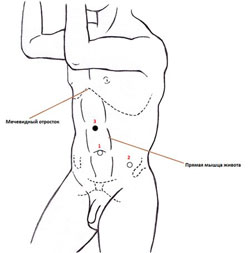 |
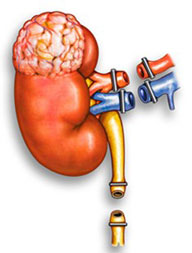 |
The indicated weight of the patient during the open surgery could cause complications in postoperative period due to severe pain syndrome, prolonged bed rest, probable development of thromboembolism, delayed wound healing of the operating wound etc. For this reason it was decided that laparoscopic radical nephrectomy should be performed.
In 07.12.2017 the patient underwent surgery by urologic surgeon V. R. Fanarjyan, MD. At the initial stage, the vessels and ureter that feed the kidney were found and neatly separated, after which they were clipped using special HemoLock clips. Then, a kidney with paranephric adipose tissue and an adrenal gland were excreted and removed within the healthy tissues. After examining the kidney bed and safely stopping the flow of blood from small vessels, the incision of 5 cm was made, through which was extracted the removed organ.
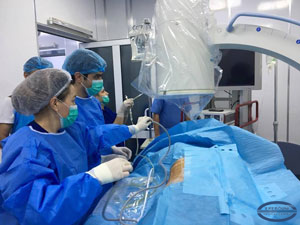 |
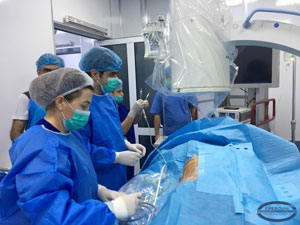 |
The average duration of the operation was 2.5 hours.
The next day the patient `s general condition was satisfactory, no complaints were noted, on the 3rd day she was discharged from the hospital.
In MC Erebouni radical nephrectomy is carried out by laparoscopic method. Urology Department is equipped with the latest surgical equipment: laparoscopic stand from Richard Wolf, Ultrasonic scalpel from Ethicon (2017), the latest coagulator Valley Lab covidien- LigaSure, and all the latest laparoscopic instruments.
High qualified medical staff have long-term experience with laparoscopic and endoscopic technique to perform various minimally invasive medical interventions. Today kidney cancer, if identified early, is a completely curable disease, but this requires timely diagnoses: passing preventive examinations once a year, including abdominal and kidney ultrasound.

